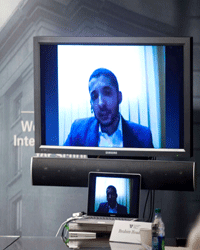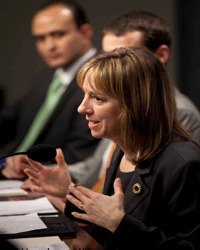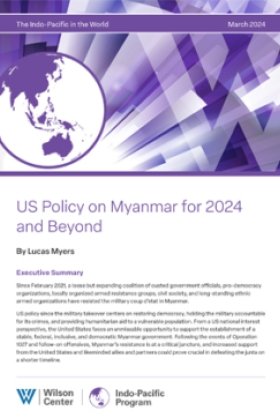Egypt's Parliamentary Elections: Expectations and Challenges
The initiation of the Egyptian parliamentary elections on November 28 presented a critical test for Egypt's fragile transition to democratic rule and was watched closely throughout the region and the world.
Overview
Co-sponsored with the Atlantic Council's Rafik Hariri Center for the Middle East and the Project on Middle East Democracy (POMED)
With the electoral process beginning November 28, Egypt's parliamentary elections will be a critical test for Egypt's fragile transition to democratic rule and will be watched closely throughout the region and the world. Four Middle East experts discussed the expectations, challenges and uncertainties Egypt faces.
On November 15, the Middle East Program of the Woodrow Wilson Center, the Atlantic Council's Rafik Hariri Center for the Middle East, and the Project on Middle East Democracy (POMED) hosted “Egypt's Parliamentary Elections: Expectations and Challenges” with Ibrahim Houdaiby, freelance journalist and researcher; Magdy Samaan, freelance journalist and a 2011 MENA Democracy Fellow, World Affairs Institute; and Michele Dunne, Director, Rafik Hariri Center for the Middle East, Atlantic Council. Haleh Esfandiari, Director of the Middle East Program, provided introductory remarks and Stephen McInerney, POMED Executive Director, moderated the event.
 Joining via Skype from Cairo, Houdaiby gave his outlook of the upcoming parliamentary elections. He said they are significant because they are the first step in handing power to the people’s representatives since the January 25 revolution. He acknowledged three key challenges to fair and free elections: the lack of democratic media, maintaining security, and the need for an independent judiciary to monitor the elections and ensure their legitimacy. Houdaiby described the current political landscape in Egypt, noting there is a leadership vacuum; there is no more than 15 percent support for any one party, which has led to an increasingly fragmented society. However, he noted such a vacuum is natural post-revolution as many political parties are still forming. In his view, these parties must look beyond the question of state identity and address issues such as the economy and foreign policy if they hope to assume leadership in Egypt.
Joining via Skype from Cairo, Houdaiby gave his outlook of the upcoming parliamentary elections. He said they are significant because they are the first step in handing power to the people’s representatives since the January 25 revolution. He acknowledged three key challenges to fair and free elections: the lack of democratic media, maintaining security, and the need for an independent judiciary to monitor the elections and ensure their legitimacy. Houdaiby described the current political landscape in Egypt, noting there is a leadership vacuum; there is no more than 15 percent support for any one party, which has led to an increasingly fragmented society. However, he noted such a vacuum is natural post-revolution as many political parties are still forming. In his view, these parties must look beyond the question of state identity and address issues such as the economy and foreign policy if they hope to assume leadership in Egypt.
In Samaan’s opinion, although the parliamentary elections will reveal the political weight of different groups in Egypt, the results will not be as important as the Tunisian elections given that the Egyptian parliament will not be instrumental in writing the constitution. Moreover, according to Samaan, discussions surrounding the elections have been largely focused on state identity while important issues such as freedom of press and women’s rights are not being addressed. He then discussed the role of the military in Egypt’s transition process, describing how the crackdown on free speech continues. Although the military have tried to justify this as an effort to maintain national security, in Samaan’s view, they are aiming to increase their role in Egypt’s political process.

Dunne outlined her concerns over how the elections would be executed. She noted a complicated electoral process has been chosen and even well-intentioned officials could make mistakes, leading to inconsistent results. She agreed with Samaan that although the results will show the “lay of the political land” in Egypt, they will not cause a significant change in civilian rule. In her view, the “larger story” is the military’s efforts to make de facto powers in Egypt de jure. She outlined how the Supreme Council of the Armed Forces (SCAF) is trying to preserve executive power to shape the writing of the constitution. If the SCAF achieves this goal, she said this could result in largely powerless civilian institutions – a similar political landscape to Pakistan – creating “major obstacles to democratization in Egypt.”
McInerney outlined the possible problems of the complicated electoral process. He said the decision to have three dates for the People’s Assembly elections would likely cause confusion among the population as well as suspicion given that results won’t be announced until January. According to McInerney, these problems are compounded by the fact that although turnout was always low for parliamentary elections in the past, 90 percent of Egyptians have expressed their intention to vote on November 28.
By Mona Moussavi, Middle East Program
Hosted By

Middle East Program
The Wilson Center’s Middle East Program serves as a crucial resource for the policymaking community and beyond, providing analyses and research that helps inform US foreign policymaking, stimulates public debate, and expands knowledge about issues in the wider Middle East and North Africa (MENA) region. Read more
Thank you for your interest in this event. Please send any feedback or questions to our Events staff.









